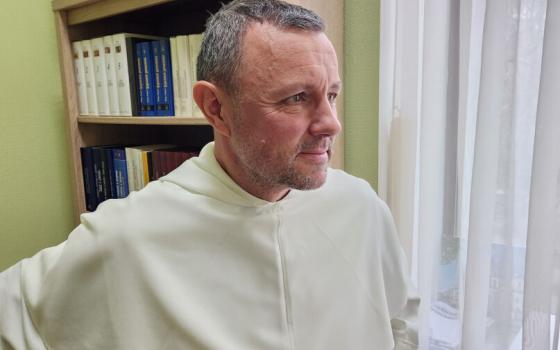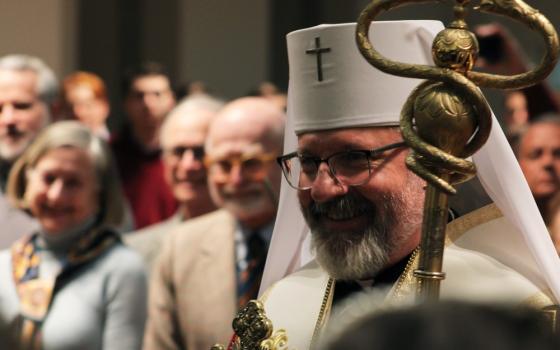In a few moments, as we always do on Sunday, we will recite what we call our profession of faith, the doctrines that we believe in, and most of the time, I think, when someone says to us, “What is your faith?” we think of those doctrines, a creator, God; or the incarnation, God becoming flesh; or the Immaculate Conception, Mary born without any sin -- all of these doctrines we think of as our faith, and it’s very intellectual. It is an aspect of our faith, but as we listen to the lessons today, we discover a very different understanding of what faith really is, and one that is, I think, much richer than simply assenting to a list of doctrine.
|
Here is how the author to the letter of the Hebrews describes faith in our second lesson today: “Faith is the confident assurance concerning what we hope for and is conviction about things we do not see.” It’s a confident assurance concerning those things that we hope for, all the things we will hope for in our life here on earth, what we hope for in heaven: fullness of life, joy, peace, deep love. All those things we hope for, faith is a confident assurance concerning those things, and it’s also conviction about things that we do not see -- God. We can’t see God, but we have a strong conviction about God. Love, joy -- those things that we can’t see, but we have conviction that we’re made to experience a fullness of life and joy and love, and we yearn for that.
This is what faith really is, that confident assurance and strong conviction, and I think if you reflect on that, you’ll notice, that’s very different from assenting to something with your mind, a doctrine. It depends upon a relationship. We have confident assurance because we have a deep relationship with God. Deep in our spirit and our heart, we know God, and we know God knows us, so we have confident assurance about those things that we hope for. Again, something like everlasting life, to be part of that cloud of witnesses that we hear about in the letter to the Hebrews, where some of our own family members already are. It’s a beautiful teaching but it depends on our relationship.
Having strong conviction about what we don’t see, that’s because we have had experiences in our life when we know God has been present. We have experienced that so we develop this relationship with God, and that’s what our lessons were about today. Our first lesson from the Book of Wisdom, the Jewish people are being reminded (and it would have been thousands of years before) that there was the time when they had fled from Egypt, they had their freedom, they were going to the Promised Land, they were at the Red Sea and suddenly they were stopped, and the army of the Egyptians was coming upon them and the writer says, “Remember what happened then. God parted the sea for you.” They experienced God’s presence so they began to have this confident assurance that God was always for them and with them.
Or in the letter to the Hebrews, Abraham and Sarah, sometime before the part that we hear about today, about a year before, they had had that visit (it was in our lesson a few weeks ago) from a stranger and they provided marvelous hospitality. Then the stranger promised that a year from now, Sarah would be with child, and it happened, even though Sarah was beyond the ordinary time for childbirth. So they began to have that real deep assurance, God is faithful. That’s why, at this point, we’re reminded in that passage that God had said to Abraham and Sarah, “Pick up everything and go. You’re going to leave all that you’re familiar with, all that you have come to cherish, and I ask you, go and start a new people,” so Abraham and Sarah pack up and leave, and it’s because they had that confident assurance God is with them. This is what faith is really about.
There’s one other example that I think of in the gospels, the gospel of John, and it’s part of the Easter gospel section. After the resurrection, Jesus was with the disciples on the beach and he helped them get this large catch of fish. You may remember the story. Then afterwards, he’s talking with Peter and challenges him, “Do you really love me?” and Peter says three times, “Lord, you know I love you.” Then after that, Jesus says to Peter (he’s got this very deep relationship with Jesus), “When you were young, you girded yourself. When you’re old, someone else will have to do that for you, and I’m going to ask you to go where you would rather not go.” Peter, he would rather not go, but he follows, and John says in the gospel, Jesus was talking about his martyrdom, but Peter had that relationship with Jesus so he had confident assurance. It made no difference -- God was with him. He had that assurance and that strong conviction. That’s what faith is.
In this week’s America magazine, there was a commentary on today’s scriptures, which gives a beautiful example of something very current where people are being challenged, in a sense, to go where they would rather not go to make a move in faith beyond their comfort level, I guess you could say. It’s written by Sister Barbara Reid, a Dominican sister, and she talks about a book called Con Mirada: Mente y Corazon de Mujer. It’s a wonderful thing, the mind and heart of a woman. That’s the name of the book. It’s about women in a rural village in Chiapas, Mexico, and one of the women reflects (this is a quote from the book), “My whole life I was taught to obey. First of all, I obeyed my father and mother. At age 12, my father decided whom I would marry. My father and his father made the agreement. I had no say, I could not object that I didn’t even know the man to whom my father had promised me. My only choice was to do my father’s will. My father and mother told me to obey the commands of my father-in-law and my mother-in-law and my husband. My father said I would only be happy if I obeyed. After I was married, I tried to obey my husband in everything. He was one who always made the decisions. I tried to be an obedient daughter and wife, but my father was wrong. I was not happy. My heart was always sad. I would cry out to God in my prayers, but the only answer I got at that time was that God ordained that it should be this way.”
But then something really beautiful happened. This woman joined with other women, and through a sharing of the scriptures, they formed a small scripture group. They began to read God’s word and listen to it deeply and they really began to understand what obedience is. Obedience isn’t simply blindly following a command; the word obedience means, “to listen deeply,” so you listen to God’s word very deeply, let it penetrate into your mind, your heart, your whole spirit. They began to do that, so they discovered, again, this is a quote, “a new meaning of obedience, that took them far beyond their initial understanding.” And in this, these women are like Sarah and Abraham and it’s described in the second reader, and like Peter and the other disciples in the gospel, because from that point on, they began to understand that they weren’t to be subservient. Their conscious was raised. They knew they were full human persons with the full dignity of every other human person, so began to live a more independent life. They came into their own. This whole story then is about women who begin, because their relationship with God is enriched, to have that confident assurance that God is leading them. They have that strong conviction about things they don’t see so they’re ready to follow and begin a whole new period in their life. They follow God and what God is teaching them because they now have a genuine faith, confident assurance and strong conviction.
That’s another thing we find happening in our church today, where God seems to be leading some of us, many of us in fact, away from sort of a blind obedience to laws that were created, the human laws, even though they were created within the institution of the church. A couple weeks ago, I was part of the national meeting of the organization called SNAP, which is a Survivors’ Network of those Abused by Priests. Now these are people, almost all of whom have had bitter experience with the hierarchy of the church. They can’t go into a church like this anymore; they’re too traumatized and hurt, so they have to find their own way, but for many of them, it’s a deeper faith life than they’ve ever had before. They discover God loves them, they can follow the path where God is leading them.
And, you know, there are 30 million people in this country, 10 percent of this population in the United States, who have walked away from our Catholic church, from the institution of the church, probably some in your families, but that doesn’t mean they’ve walked away from God for some of them because perhaps they’re gay or lesbian and they’ve been excluded, called disordered, and they can’t accept that. They know they’re good people so they have to walk away, but it’s God calling them, and with confident assurance and strong conviction, they go where perhaps they would rather not have gone. But they do it because they have faith.
So all of us, I think, have to keep on listening in our lives to God speaking to us deeply within our spirit and develop a relationship to God, not a relationship to a human institution, not a relationship to human laws, not intellectual assent to doctrines, but we must develop a relationship with God that will give us that confident assurance and strong conviction that when God asks us to move in some way in our life, or to accept some difficulty in our life that we would rather not, that we can go where God needs us with confidence, with joy, and with peace in our hearts.
And so I hope, as we listen to today’s scriptures, that all of us will begin to understand what faith really is. It’s that deep relationship with God that gives us confident assurance concerning those things we hope for and a strong conviction about the things we cannot see. With that kind of faith, we will find deep peace and joy in our lives now and will lead us into the fullness of life with God forever in heaven.
[Bishop Gumbleton preached this homily at St. Hilary Parish, Redford, Mich.]



